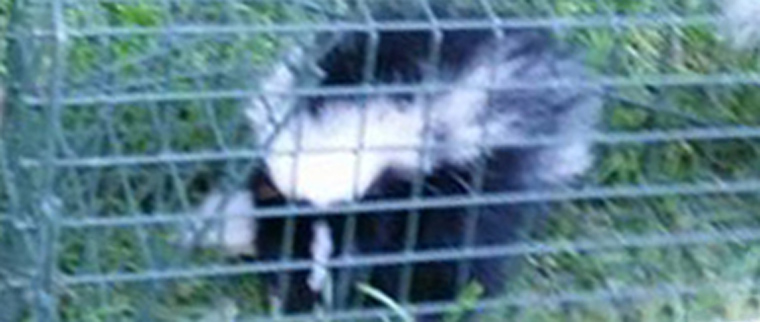-
info@aaanimalcontrol.com
Call us for help in your town
Humane Wildlife Education
Do Skunks Live In Groups Or Alone?
Need skunk removal in your hometown? We service over 500 USA locations! Click here to hire us in your town and check prices - updated for year 2020.
Skunks are one of the most distinctive and easy to
identify species in North America, and the most
common variant the Striped Skunk with its white
stripe contrasting with the black fur is certainly
not an animal that tries to blend in with its
surroundings. Like most animals of this size they
are not normally pack animals, however this
certainly doesn’t mean that they live all of their
lives alone. There are also seasonal changes that
affect how social a skunk is likely to be, and all
of these factors contribute to the fact that
depending on their age and stage of development,
skunks can either live in groups of alone.

The Normal Habits Of The Male Skunk
The natural instinct of the male adult skunk is to
be a fairly solitary animal, as it will usually
have a range that it will defend from other
solitary skunks, and in these areas it will
usually have food and water sources. The skunk
does have the capacity to dig its own den if
required, but in many cases it will prefer to take
an unused den from another animal if the
opportunity is available. While most skunks will
be solitary outside of the mating season, in
colder areas skunks will often share a den so that
they can share their warmth during the colder
weather, although these groups will usually be
made up of one male and one or more females.
Skunks During Mating Season
The difference in behavior for skunks during
mating season is quite drastic, as from February
through until March, males will be actively
looking for a female, or several female skunks,
and they will often be roaming several miles a
night. During this period the male can be
polygamous, and may try to mate with several
females during the season. While the males are
active and social with females during the mating
season, once they are impregnated and are starting
the gestation period, the males will then move
back to being solitary animals, and they take no
part in rearing the young that they have helped to
produce.
Females With Baby Skunks
Once a female has been impregnated then she will
then start looking for a den, and in these cases,
they will usually find their own den from which to
raise their young, and in most cases this will be
separate to the winter den that the female will
have used. The skunk kits are very vulnerable when
they are younger, so they will remain with their
mother for several months before they are able to
start moving on and looking for their own
territories and dens. As with adults, males will
have to go searching for their own territory,
while females are a little more tolerant of other
skunks living near them.
How This Affects Those Trying To Remove A
Skunk
The key factor to note from this is that you will
need to be careful if you are dealing with a skunk
problem in the late spring and summer, as this is
when you will find that the females will have
babies in their nest. However, if you are dealing
with a problem skunk, whether you use exclusion
from a yard or garden or whether you trap and
remove the animal, you will also have to check if
there are any babies in the nest. Once you’ve
removed the animal, it is also worth fencing the
area and ensuring this is in good condition, and
sealing the area where the skunk had been able to
make its nest.
For more information, you may want to click on one
of these guides that I wrote:
How much
does skunk removal cost? - get the lowdown
on prices.
How
to get rid of skunks - my main skunk removal
info guide.


















